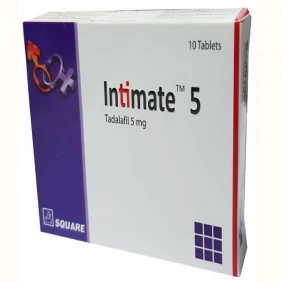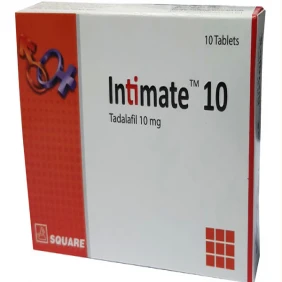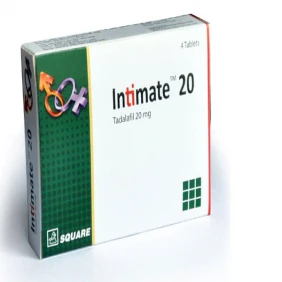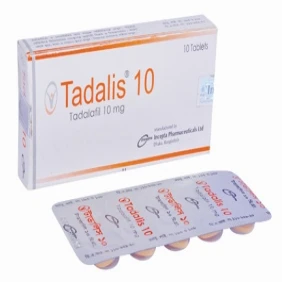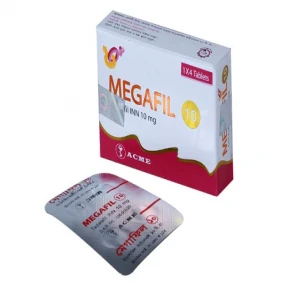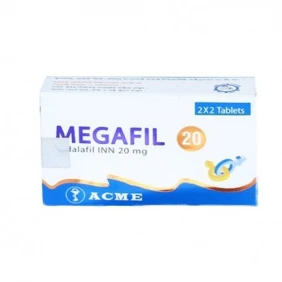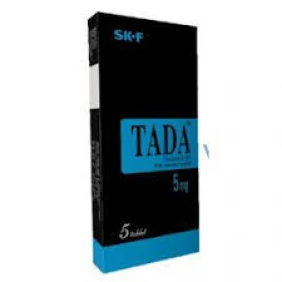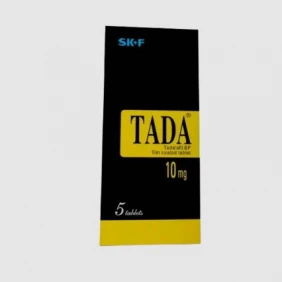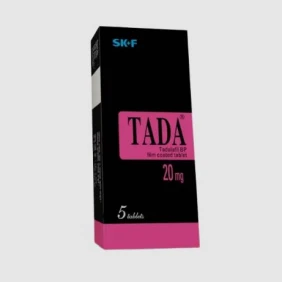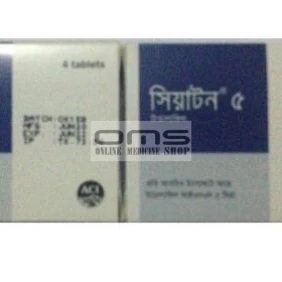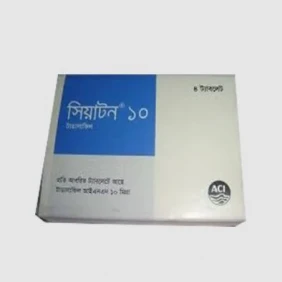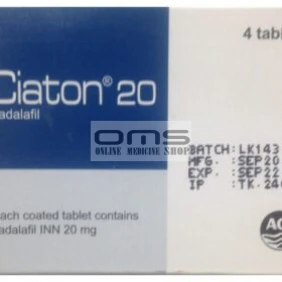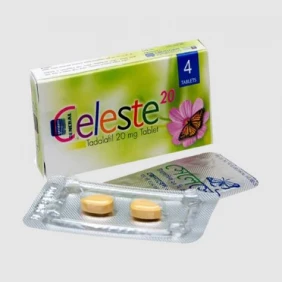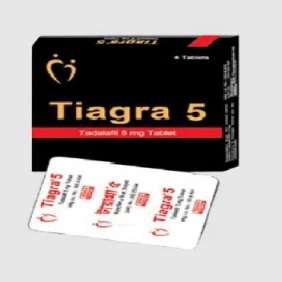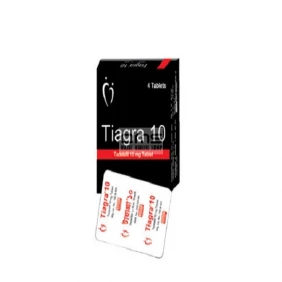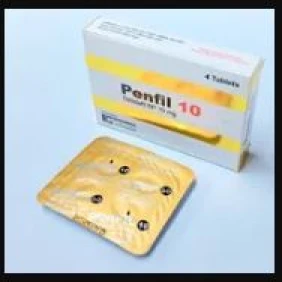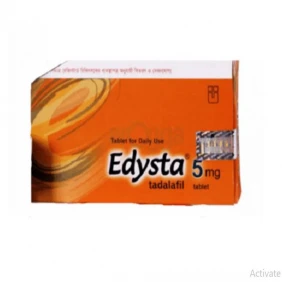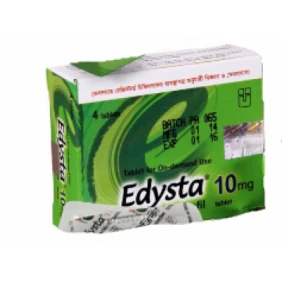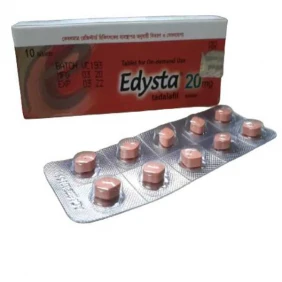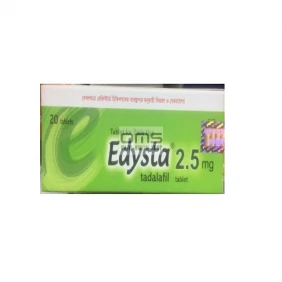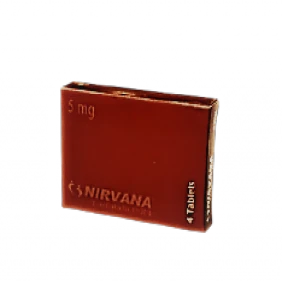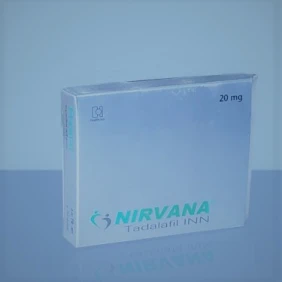
Tablet Tadalis 5 - mg
৳ 0
Quantity:
1
Order By Call:
+88 01540 384 786 (Mobile)
+88 01819 479 004 (WhatsApp)
About the Product
Full Description
\n
\n
\n \n
\n \n
\n \n
\n \n
\nPresentation
\nTadalis 5 tablet: Each tablet contains 5 mg of Tadalafil INN. \n \n \n
\nDescription
\nTadalafil is a selective, reversible inhibitor of cyclic guanosine monophosphate (cGMP)-specific phosphodiesterase type 5 (PDE5). When sexual stimulation causes the local release of nitric oxide; inhibition of PDE5 by Tadalafil produces increased levels of cGMP in the corpus cavernosum. This results in smooth muscle relaxation and inflow of blood into the penile tissues, thereby producing an erection. Tadalafil has no effect in the absence of sexual stimulation. \n \nCLINICAL PHARMACOLOGY \n \nPenile erection during sexual stimulation is caused by increased penile blood flow resulting from the relaxation of penile arteries and corpus cavernosal smooth muscle. This response is mediated by the release of nitric oxide (NO) from nerve terminals and endothelial cells, which stimulates the synthesis of cGMP in smooth muscle cells. Cyclic GMP causes smooth muscle relaxation and increased blood flow into the corpus cavernosum. The inhibition of phosphodiesterase type 5 (PDE5) enhances erectile function by increasing the amount of cGMP. Tadalafil inhibits PDE5. Because sexual stimulation is required to initiate the local release of nitric oxide, the inhibition of PDE5 by Tadalafil has no effect in the absence of sexual stimulation. The effect of PDE5 inhibition on cGMP concentration in the corpus cavernosum and pulmonary arteries is also observed in the smooth muscle of the prostate, the bladder and their vascular supply. The mechanism for reducing BPH symptoms has not been established. \n \n \n
\nIndications
\nTreatment of erectile dysfunction, benign prostatic hyperplasia and erectile dysfunction with benign prostatic hyperplasia. \n \n \n
\nDosage & Administration
\nErectile dysfunction: \nFor oral use. In order for Tadalafil to be effective, sexual stimulation is required. \nUse in adult men \nThe recommended dose is 10 mg taken prior to anticipated sexual activity and without regard to food. In those patients in whom Tadalafil 10 mg does not produce an adequate effect, 20 mg might be tried. It can be taken from 30 minutes to 12 hours prior to sexual activity. Efficacy of Tadalafil may persist up to 24 hours post-dose. The maximum recommended dosing frequency is once per day. \nBenign prostatic hyperplasia: \n5 mg, taken at approximately the same time every day. \nErectile dysfunction with benign prostatic hyperplasia: \n5 mg, taken at approximately the same time every day. \nUse in elderly men: \nDosage adjustments are not required in elderly patients. \nUse in men with impaired renal function: \nThere are no available data about the administration of doses higher than 10 mg of Tadalafil to patients with renal impairment. \nUse in men with impaired hepatic function: \nThere are no available data about the administration of doses higher than 10 mg of Tadalafil to patients with hepatic impairment. \nUse in men with diabetes: \nDosage adjustments are not required in diabetic patients. \nUse in children: \nTadalafil should not be used in individuals below 18 years of age. \n \n \n
\nSide Effects
\nThe most commonly reported adverse reactions are headache, dizziness, flushing and dyspepsia, nasal congestion, back pain, myalgia, swelling of eyelids is uncommon adverse reactions. The adverse events reported with Tadalafil were transient, and generally mild or moderate. \n \n \n
\nPrecautions
\n? Prior to initiating any treatment for erectile dysfunction, physicians should consider the cardiovascular status of their patients, since there is a degree of cardiac risk associated with sexual activity. \n? Tadalafil has vasodilator properties, resulting in mild and transient decreases in blood pressure \n? There is limited clinical data on the safety of Tadalafil in the following groups; if prescribed, a careful individual benefit/risk evaluation should be undertaken by the prescribing physician: \n? Patients with severe renal insufficiency \n? Patients with severe hepatic insufficiency \n? Tadalafil should not be administered to patients with hereditary problems of galactose intolerance. \n? The safety and efficacy of combinations of Tadalafil and other treatments for erectile dysfunction have not been studied. Therefore, the use of such combinations is not recommended. \n? Caution should be exercised when Tadalafil is administered to patients with anatomical deformation of the penis. \n? Patients who suffer from problems that increase the possibility of Priapism (sickle-cell anemia, multiple myeloma, leukemia) should use this product with caution. \n \n \n
\nUse in Pregnancy & Lactation
\nTadalafil is not indicated for use by women. There are no studies of Tadalafil in pregnant women. \n \n \n
\nDrug Interaction
\nEffects of other medicinal products on Tadalafil \nAlthough specific interactions have not been studied, some protease inhibitors, such as ritonavir and saquinavir, and other CYP3A4 inhibitors, such as erythromycin, clarithromycin, itraconazole and grapefruit juice, should be co-administered with caution as they would be expected to increase plasma concentrations of Tadalafil. Concomitant administration of other CYP3A4 inducers, such as rifampicin, Phenobarbital, phenytoin and carbamazepine, will also decrease plasma concentrations of Tadalafil. \nEffects of tadalafil on other medicinal products \nIn clinical studies, Tadalafil (10 mg) was shown to augment the hypotensive effects of nitrates. Therefore, administration of Tadalafil to patients who are using any form of organic nitrate is contra-indicated. Tadalafil (10 mg) had no clinically significant effect on the plasma concentration of warfarin, nor did Tadalafil affect changes in prothrombin time induced by warfarin. Tadalafil (10 mg) did not potentiate the increase in bleeding time caused by acetylsalicylic acid. In clinical pharmacology studies, the potential for Tadalafil to augment the hypotensive effects of antihypertensive agents was examined. Concomitant administration of Tadalafil with the major classes of antihypertensive agents were studied, including calcium channel blockers (amlodipine),angiotensin converting enzyme (ACE)inhibitors (enalapril),beta-adrenergic receptor blockers (metoprolol),thiazide diuretics (bendrofluazide),and angiotensin II receptor blockers, did not affect the hypotensive effect of these drugs .Tadalafil (10 mg,except for studies with angiotensin II receptor blockers and amlodipine in which a 20 mg dose was applied) had no clinically significant interaction with any of these classes. No changes in Tadalafil concentrations were seen 3 hours after co-administration with alcohol. When Tadalafil 10 mg was administered with theophylline in a clinical pharmacology study, there was no pharmacokinetic interaction. The only pharmacodynamic effect was a small increase in heart rate. Specific interaction studies with antidiabetic agents were not conducted. \n \n \n
\nOver Dose
\nSingle doses of up to 500 mg have been given to healthy subjects, and multiple daily doses up to 100 mg have been given to patients. Adverse events were similar to those seen at lower doses. In cases of overdose, standard supportive measures should be adopted, as required. \n \n \n
\nCommercial Pack
\nTadalis 5 Tablet : Each box contains 1 blister strip of 5 film-coated tablets. \n \nReviews:
No Review
Releted Products



